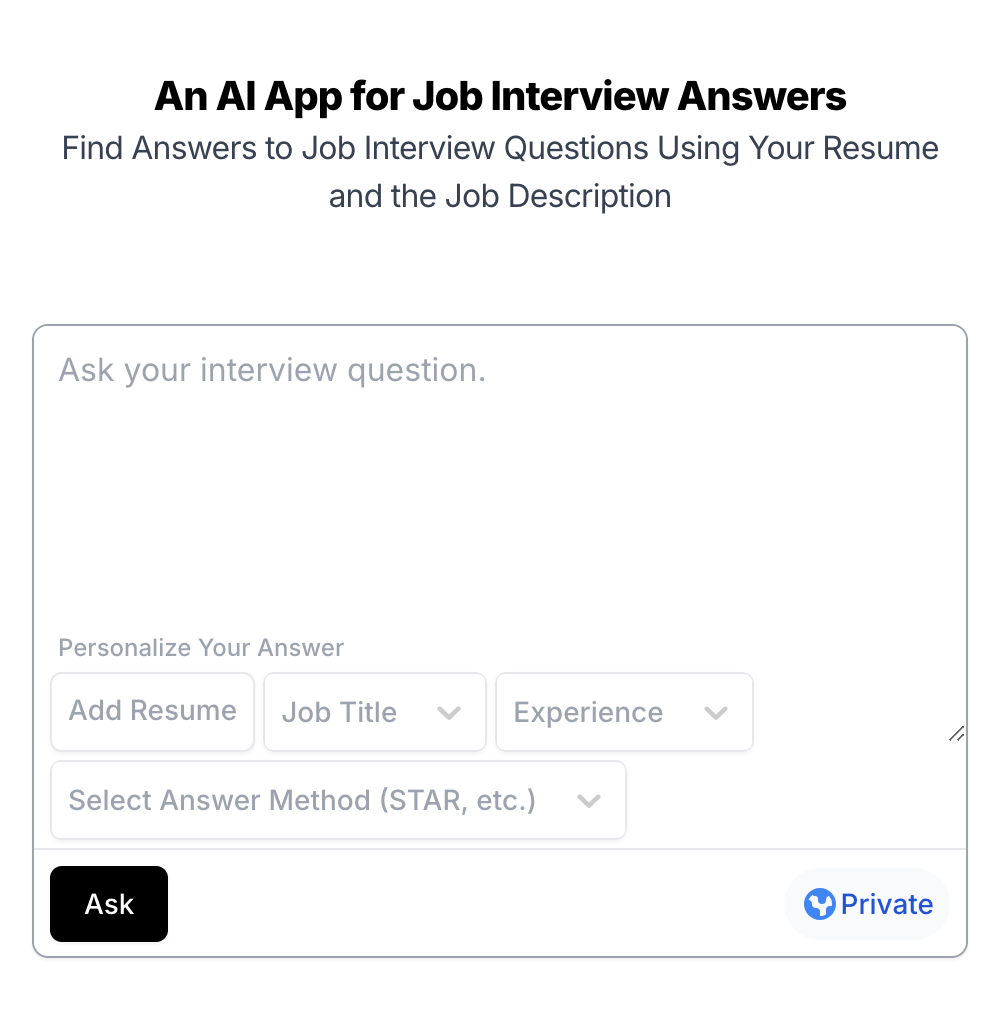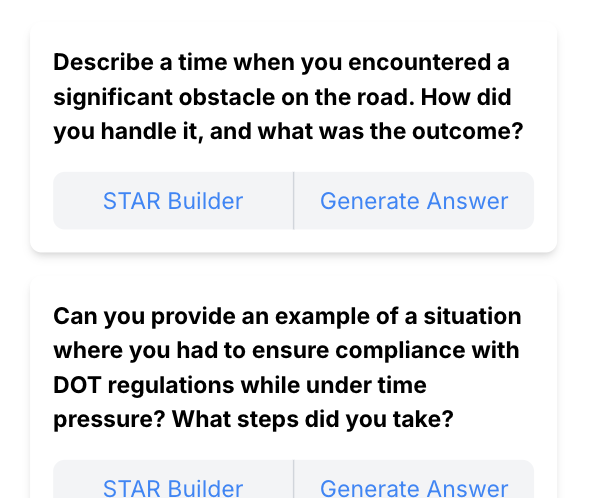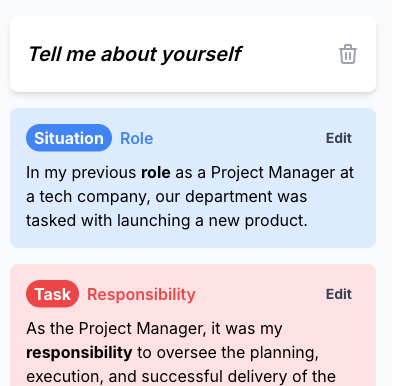
Competency-Based Interview Questions: What You Need to Know
Fri Aug 23 2024•Author: InterviewPro AI
Table of Contents
- What Are They?
- Common Examples
- Answer Length
- What to Avoid Saying
- Possible Follow-Ups
- More Follow-Up Questions
- When They're Asked
- Who Asks Them
- Why They Matter
- How to Answer Well
- Answer Structure
What Are They?
Competency-based questions ask about your past experiences to see how you've used specific skills. Employers use them to check if you have the abilities they need. They want to know how you've handled real situations in the past.
5 Common Examples
- Tell me about a time you worked well in a team.
- Describe a situation where you had to solve a difficult problem.
- Give an example of when you had to meet a tight deadline.
- Tell me about a time you had to deal with a difficult customer or colleague.
- Describe a project you led and what you achieved.
Answer Length
Aim to keep your answer to about 2-3 minutes. This gives you enough time to describe the situation, your actions, and the results. Your answer should be detailed but not too long.
What to Avoid Saying
Don't say these things when answering competency-based questions:
-
Don't give vague answers Bad example: "I'm always a team player." Why it's bad: This doesn't give a specific example of your skills.
-
Don't talk about skills you don't have Bad example: "I've never led a team, but I'm sure I could do it." Why it's bad: The interviewer wants to hear about your actual experiences.
-
Don't focus only on the problem Bad example: "We had a really difficult client who was always complaining." Why it's bad: This doesn't show how you handled the situation.
-
Don't blame others Bad example: "The project failed because my team didn't work hard enough." Why it's bad: This suggests you don't take responsibility.
-
Don't give made-up examples Bad example: (Making up a story that didn't happen) Why it's bad: If you get caught, it will damage your credibility.
-
Don't give irrelevant examples Bad example: (Talking about your cooking skills for a finance job) Why it's bad: The example should relate to the job you're applying for.
-
Don't forget to mention results Bad example: "I worked really hard on the project." (without saying what happened) Why it's bad: The interviewer wants to know the outcome of your actions.
Show that you have real experience using the skills they're looking for in professional situations.
Possible Follow-Ups
After you answer, the interviewer might ask more about your experience. They could ask about:
-
Your role: They might want to know exactly what you did in the situation. Example: "What was your specific role in that project?"
-
The outcome: They could ask for more details about the results. Example: "What was the long-term impact of your solution?"
-
What you learned: They might ask how the experience changed you. Example: "What did you learn from that situation that you still use today?"
-
Other people involved: They could ask about how you worked with others. Example: "How did you get buy-in from your team for your approach?"
-
Challenges: They might ask what problems you faced. Example: "What was the biggest challenge in that situation and how did you overcome it?"
-
Different approaches: They could ask if you'd do anything differently now. Example: "Looking back, would you change anything about how you handled that situation?"
5 More Follow-Up Questions
- "How did you measure the success of your actions?"
- "Can you give an example of how you've used that skill in a different situation?"
- "How did that experience prepare you for this role?"
- "What feedback did you receive about your performance in that situation?"
- "How did you handle any setbacks or unexpected issues?"
When They're Asked
You might hear these questions at different times:
-
Initial Screening: You might get a few basic competency questions to check if you meet the job requirements. Example: "Can you tell me about a time you had to learn a new skill quickly?"
-
First Interview: This is when you'll probably get most competency-based questions, mixed with other types. Example: "Describe a situation where you had to influence someone to change their mind."
-
Second or Third Interviews: You might get more in-depth questions about specific competencies. Example: "Tell me about the most complex project you've managed. How did you ensure its success?"
-
Panel Interviews: Different interviewers might ask about various competencies. Example: "Can you give an example of when you had to make a difficult decision with limited information?"
-
Assessment Centers: You might have to demonstrate competencies in group exercises or presentations. Example: "In this group task, we'll be looking at how you demonstrate leadership and teamwork skills."
These questions can come up at any stage, depending on the company's hiring process and the role you're applying for.
Who Asks Them
-
HR Professionals: Example: "Tell me about a time you had to adapt to a significant change at work."
-
Hiring Managers: Example: "Can you describe a situation where you had to motivate a team to meet a challenging goal?"
-
Department Heads: Example: "Give me an example of how you've contributed to improving a work process."
-
Potential Colleagues: Example: "Tell us about a time you had to collaborate with a difficult team member."
-
Senior Executives: Example: "Describe a situation where you had to make a strategic decision that affected the entire organization."
-
External Recruiters: Example: "Can you give an example of how you've demonstrated leadership in your current role?"
The person asking usually focuses on competencies that are most relevant to the job or company culture.
Why They Matter
These questions help employers see how you've used your skills in real situations. They show your experience and how you handle challenges. Employers use these questions to predict how well you might perform in the job based on your past actions.
How to Answer Well
- Choose relevant examples from your experience
- Be specific about what you did
- Explain your thought process and decisions
- Describe the outcome and what you learned
- Link your example to the job you're applying for
Answer Structure
Use the STAR method to structure your answer:
- Situation: Briefly describe the context
- Task: Explain what you needed to do
- Action: Describe the steps you took
- Result: Share the outcome and what you learned
Competency-based questions let you showcase your skills through real examples. Use them to demonstrate how your experience makes you a great fit for the job. Your answers help employers understand how you work and solve problems, so focus on clear, relevant examples that highlight your abilities.
Can't find what you're looking for?
Try our AI-Powered Interview Preparation Tools
Prepare for your job interview with our AI tools. Tailored answers, custom questions, and STAR method responses.


